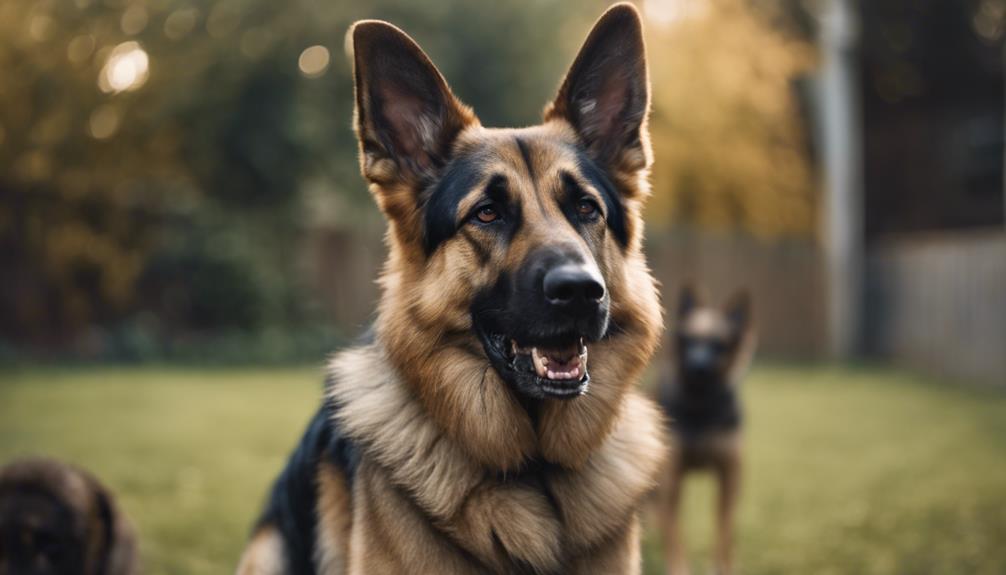🐾 Paw-some Partnership Alert! 🐾
As a pack of German Shepherd enthusiasts at MixGermanShepherd.com, we're always sniffing out the best products for our furry friends. Guess what? When you fetch something from Amazon through our links, we earn a little treat! 🦴
If your German Shepherd mix displays aggression towards strangers, other dogs, or family members, it can be a challenging situation to navigate. Understanding the underlying reasons behind the aggression is crucial for effective management and behavior modification. By exploring triggers, implementing tailored training techniques, and considering professional guidance, you can work towards a harmonious relationship with your furry companion. But how can you identify these triggers and develop a customized approach to address your dog's aggression effectively? Stay tuned to discover key insights and strategies to help you navigate this complex issue with your German Shepherd mix.
Key Takeaways
- Genetic lineage influences aggression triggers.
- Socialization and training techniques shape behavior.
- Identifying health-related causes is crucial.
- Tailored strategies and professional help are essential for managing aggression.
Understanding Aggression in German Shepherd Mixes

To comprehend the behavioral complexities of German Shepherd mixes, examining their genetic lineage is crucial in identifying potential triggers for aggression. German Shepherd mixes may display aggressive tendencies inherited from their parent breeds. Understanding the behavior patterns within the specific mix is essential for addressing and managing aggression effectively. These mixes can exhibit a combination of behaviors, making it necessary to tailor training methods to suit their individual needs. Socialization plays a pivotal role in shaping the behavior of German Shepherd mixes, helping them interact positively with people and other animals. Positive reinforcement training techniques are also vital in encouraging desired behaviors and discouraging aggression.
When dealing with aggression in German Shepherd mixes, seeking professional help is highly recommended. Consulting with experts can provide valuable insights and personalized strategies to address aggression triggers. By working with professionals experienced in canine behavior, you can develop a comprehensive plan to manage and modify aggressive behavior in your German Shepherd mix effectively.
Socialization and Training Techniques
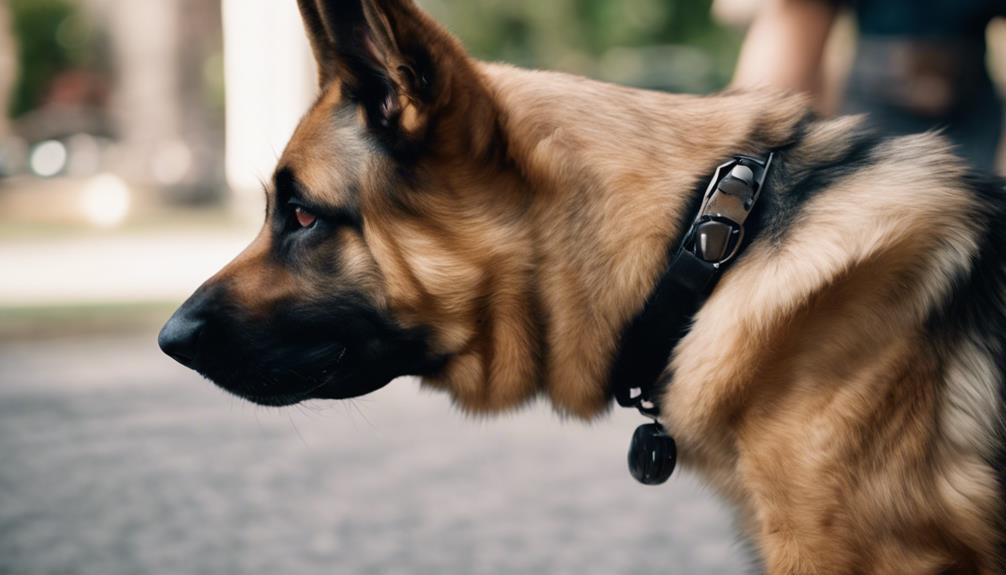
Utilizing a structured socialization regimen early on is essential for fostering positive behaviors and reducing aggression in German Shepherd mixes. Socialization involves exposing your German Shepherd mix to various environments, people, and animals from a young age to prevent aggressive tendencies from developing. Training techniques play a pivotal role in addressing and managing aggression in these breeds. Positive reinforcement methods, such as rewarding good behavior, and enrolling in obedience classes can significantly aid in curbing aggression. Consistent training routines not only help in obedience but also in building trust and confidence, reducing the likelihood of aggressive behavior.
In addition to basic training, utilizing desensitization and counter-conditioning techniques can effectively modify aggressive tendencies in German Shepherd mixes. These methods involve gradually exposing the dog to triggers in a controlled manner, paired with positive experiences to change their response. Seeking guidance from certified dog trainers specialized in behavior modification is highly recommended for effectively addressing and managing aggression in German Shepherd mixes.
Managing Fear and Anxiety
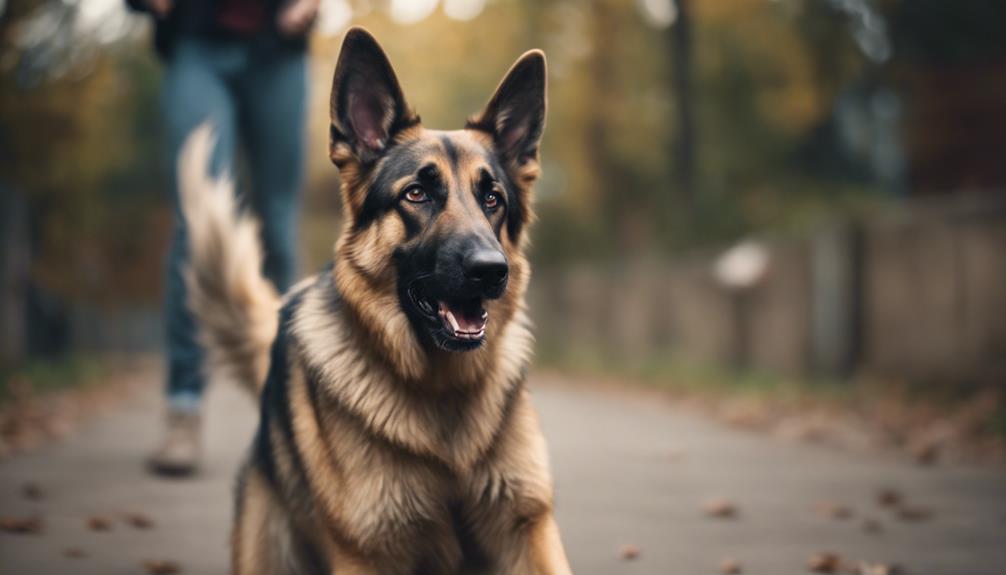
Fear and anxiety in German Shepherd mixes often manifest as aggression towards other dogs or people, requiring careful management strategies for a harmonious environment. When dealing with fear and anxiety in German Shepherd mixes, consider the following:
- Gradual exposure to fear-inducing stimuli in controlled environments can help reduce fear-based aggression.
- Utilizing calming aids like melatonin for dogs may be beneficial in managing anxiety-related aggression.
- Seek professional help for severe cases of fear and anxiety in German Shepherd mixes to ensure proper support and guidance.
- Understanding individual triggers is crucial for addressing fear and anxiety, allowing for targeted interventions.
- Implement desensitization techniques to help your German Shepherd mix overcome their fears gradually and build confidence in anxiety-inducing situations.
Addressing Territorial Behavior
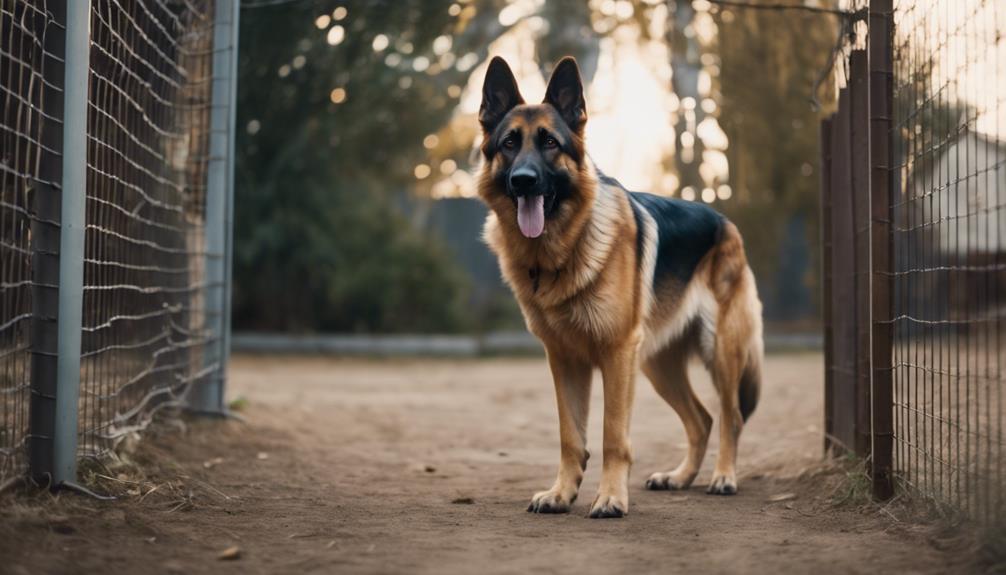
How can you effectively address territorial behavior in German Shepherd mixes to prevent aggressive reactions towards perceived intruders or unfamiliar individuals? Territorial behavior, stemming from the breed's protective instincts, can lead to aggression in German Shepherd mixes. To manage this behavior, focus on socialization, training, and establishing clear boundaries. Engaging in structured activities or sports can provide positive outlets for their protective instincts, helping to mitigate territorial aggression. Seeking assistance from professional trainers or behaviorists can offer tailored strategies for modifying this behavior effectively. Below is a table outlining key steps to address territorial behavior in German Shepherd mixes:
| Key Steps | Description |
|---|---|
| Socialization | Expose your dog to various people, animals, and environments positively. |
| Training | Teach obedience commands and reinforce good behavior consistently. |
| Establish Clear Boundaries | Define areas where the dog is allowed and not allowed to roam freely. |
Identifying Health-Related Aggression
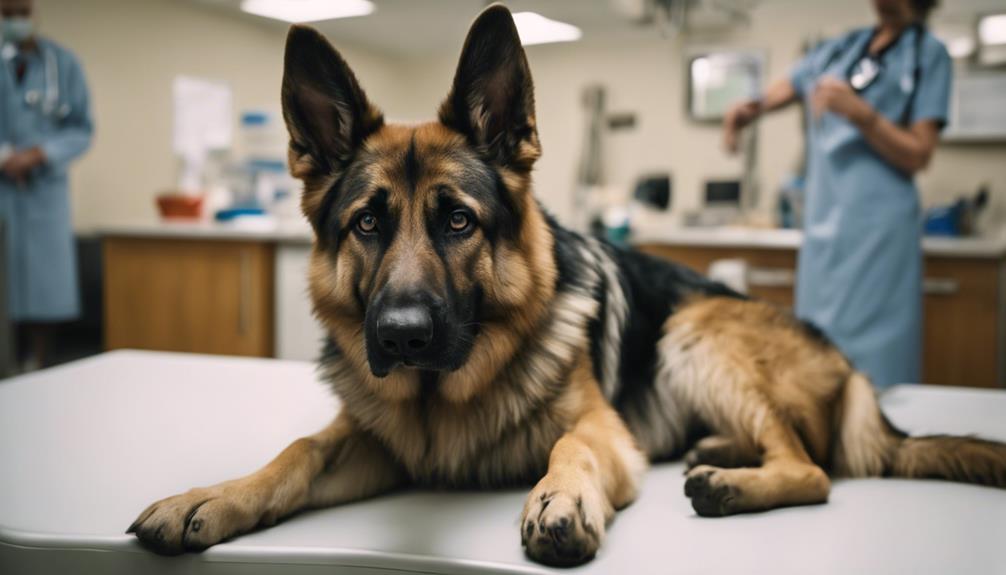
When addressing health-related aggression in German Shepherd mixes, recognizing potential links to underlying medical conditions such as hip dysplasia or arthritis is crucial. Health-related aggression may stem from chronic pain, discomfort, or undiagnosed medical issues. To effectively identify and address health-related aggression, keep an eye out for signs of physical discomfort such as limping or reluctance to move. Consulting a veterinarian for a comprehensive examination and diagnostic tests is essential in pinpointing the health issues contributing to aggression. Once the underlying medical conditions are identified, developing a comprehensive treatment plan becomes necessary. This plan may involve pain management strategies, physical therapy sessions, or in severe cases, surgical interventions. By addressing the root cause of the aggression through a thorough assessment and tailored treatment plan, you can help your German Shepherd mix find relief and improve their behavior significantly.
Seeking Professional Assistance
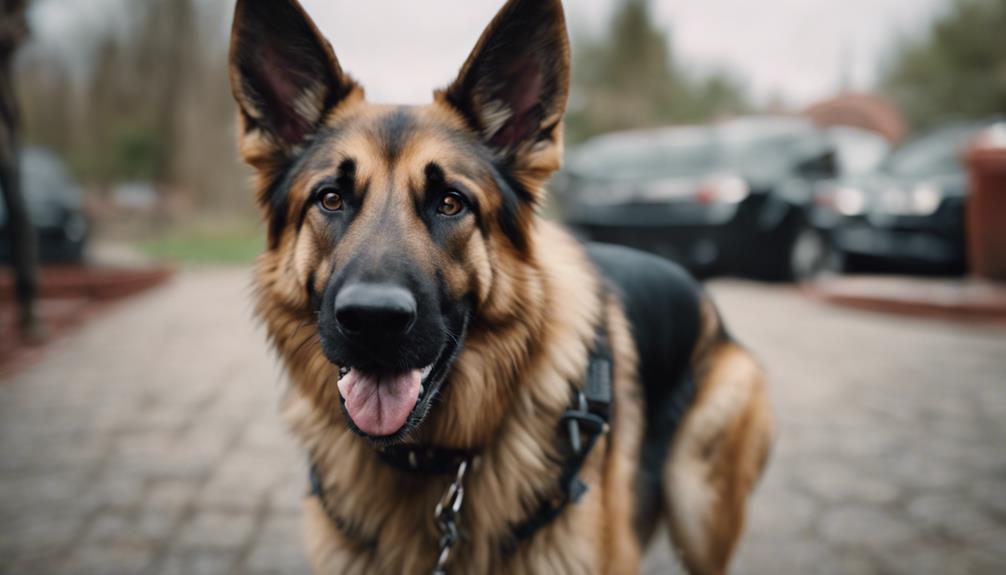
Professional assistance from certified dog trainers and behaviorists plays a pivotal role in effectively addressing aggression in German Shepherd mixes. These professionals are equipped to conduct thorough aggression assessments, identifying triggers and underlying causes. By tailoring behavior modification plans to the specific needs of the dog, trainers can offer specialized techniques for managing aggression. Seeking professional help early on is crucial as it can prevent the escalation of aggressive behaviors and create a safe environment for both the dog and its owners. Beyond the assessment and modification plans, behaviorists and trainers can provide effective strategies and support resources to aid in dealing with aggression in German Shepherd mixes. Their expertise can make a significant difference in the well-being and behavior of your furry companion, ensuring a harmonious relationship within the household. Therefore, do not hesitate to reach out for professional help when facing aggression issues with your German Shepherd mix.
Implementing Feeding and Medication Plans

To effectively manage aggression in your German Shepherd mix, it is crucial to establish a consistent feeding schedule and adhere to a prescribed medication plan. Maintaining a feeding routine helps create stability and predictability for your dog, while proper medication administration is essential for addressing aggression. By consulting with a veterinarian and closely monitoring your dog's response to medication, you can tailor the treatment plan to suit your German Shepherd mix's needs.
Feeding Routine Importance
Establishing a consistent feeding routine for your German Shepherd mix is essential for regulating behavior and reducing anxiety, ultimately aiding in managing aggression. A structured schedule can create a sense of security for your dog, promoting stability. Here are some key points to consider:
- Properly portioned meals: Ensure your dog receives the right amount of food for their needs.
- Timely medication administration: Administer medications as prescribed by your veterinarian.
- Monitoring food intake: Keep track of what your dog eats to maintain a healthy diet.
- Adherence to medication: Follow the medication schedule to support your dog's well-being.
- Consulting with a veterinarian: Seek professional guidance to tailor a feeding and medication plan specific to your German Shepherd mix.
Medication Regimen Adherence
Ensuring strict adherence to your German Shepherd mix's medication regimen is crucial in maintaining their health and managing aggression effectively. Implement a consistent feeding schedule to optimize medication absorption. Use pill pockets or mix medications with food to ease administration. Follow vet-prescribed dosages and timings meticulously to uphold therapeutic levels in your dog's system. Monitor your German Shepherd mix for any side effects or adverse reactions, promptly consulting your vet if needed. Keep detailed records of medication administration and your dog's response to track progress and adjust the treatment plan accordingly. By staying diligent and observant, you can help your German Shepherd mix benefit fully from the prescribed medications and support their well-being in addressing aggression.
Frequently Asked Questions
How Do You Fix a German Shepherd Aggression?
To address German Shepherd aggression, utilize training methods and behavioral modification techniques. Employ positive reinforcement, seek professional help, implement socialization techniques, understand triggers, set consistent boundaries, and meet exercise requirements. Monitor progress and adjust strategies as needed for effective management.
Are Mixed German Shepherds Aggressive?
Mixed German Shepherds can vary in aggression levels due to genetic factors and breed tendencies. Proper training methods, socialization techniques, and positive reinforcement can help manage behavioral triggers. Understanding individual needs and seeking professional help are crucial.
How Do You Discipline an Aggressive German Shepherd?
When dealing with an aggressive German Shepherd, focus on positive reinforcement, behavior modification, and consistent discipline. Seek professional training for guidance, understand triggers, use socialization techniques, establish an exercise routine, and provide mental stimulation for a well-rounded approach to managing aggression.
How Do I Stop My German Shepherd From Attacking My Other Dog?
To stop your German Shepherd from attacking your other dog, focus on behavioral training with socialization techniques. Use positive reinforcement, understand triggers, seek professional help if needed. Maintain consistent boundaries, supervise interactions, and incorporate an exercise regimen to promote a harmonious relationship between your dogs.
Conclusion
In conclusion, addressing aggression in German Shepherd mixes requires a multi-faceted approach that includes socialization, training, and managing underlying factors such as fear and health issues. By implementing these strategies and seeking professional assistance when needed, you can effectively manage and improve your dog's behavior. Remember, "barking up the wrong tree" by solely focusing on one aspect may not lead to long-term success in addressing aggression in your German Shepherd mix.
